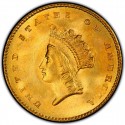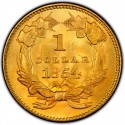- United States Coins
- Small Head Indian Princess Gold Dollars
- 1854 Small Head Indian Princess Gold Dollar
1854 Small Head Indian Princess Gold Dollar
Coin Info
1854 was an important year for gold dollar coins. A major design change occurred, modifying the design of the gold dollar from the distinct Liberty Head type of 1849-1854 to the Indian Princess Head design. Both designs had been created by James B. Longacre, who served as the Chief Engraver of the United States Mint. In fact, Longacre designed all three types of gold dollar coins, which were produced from 1849 through 1889. In addition to the implementation of the Indian Princess Head design beginning in 1854, the new gold dollar also features a wider diameter than its predecessor.
Beginning in 1854, the diameter of the gold dollar increased from 13 millimeters to 15 millimeters; the coin was enlarged to help eliminate complaints that the small coin was too easily dropped or lost in pocket holes. It should be remembered, too, that one dollar represented a lot of money in the 1850s, so losing a gold dollar was a substantial financial loss at the time.
The 1854 Indian Princess Head gold dollar features what numismatists call a “small head.” This reference has to do with the size of the Indian’s head on the obverse of the coin; the head would be significantly enlarged in 1856 to improve the strike result. The 1854 Indian Princess Head gold dollars were minted in substantial quantity at the Philadelphia Mint, with 783,943 pieces being struck. In Very Fine-20, the 1854 gold dollar is worth $721, which is substantially more than the coin’s intrinsic gold value. It’s also the case with these early gold dollars that values are more dependent upon collector demand than bullion market fluctuations. To better illustrate just how little precious metal is contained within these coins, the gold dollar weighs just 1.672 grams and contains 0.04837 ounces of gold.
The tiny gold dollar would gain greater numismatic appreciation in the 1870s and 1880s, and became very popular in the jewelry trade. Proof specimens of the coin sold for $1.25 at the Philadelphia Mint and banks also charged for business strikes. Collectors would end up putting many of these gold dollars away as the public became aware of the lower-mintage pieces.
1854 Small Head Indian Princess Gold Dollars for Sale
-
{{#owner}}
-
{{#url}}
{{#avatarSrc}}
{{name}} {{/url}} {{^url}} {{#avatar}} {{& avatar}} {{/avatar}} {{name}} {{/url}} - {{/owner}} {{#created}}
- {{created}} {{/created}}


